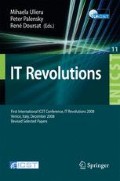Abstract
Semantic similarity models are a series of mathematical models for computing semantic similarity values among nodes in a semantic net. In this paper we reveal the paradox in the applications of these semantic similarity models in the field of information retrieval, which is that these models rely on a common prerequisite – the words of a user query must correspond to the nodes of a semantic net. In certain situations, this sort of correspondence can not be carried out, which invalidates the further working of these semantic similarity models. By means of two case studies, we analyze these issues. In addition, we discuss some possible solutions in order to address these issues. Conclusion and future works are drawn in the final section.
Access this chapter
Tax calculation will be finalised at checkout
Purchases are for personal use only
Preview
Unable to display preview. Download preview PDF.
References
Andreopoulos, B., Alexopoulou, D., Schroeder, M.: Word Sense Disambiguation in Biomedical Ontologies with Term Co-occurrence Analysis and Document Clustering. Int. J. Data Mining and Bioinformatics 2, 193–215 (2008)
Jiang, J.J., Conrath, D.W.: Semantic Similarity Based on Corpus Statistics and Lexical Taxonomy. In: International Conference on Research in Computational Linguistics (ROCLING X), Taiwan, pp. 19–33 (1997)
Curtis, J.C., Baxter, D.: On the Application of the Cyc Ontology to Word Sense Disambiguation. In: The 19th International Florida Artificial Intelligence Research Society Conference (FLAIRS 2006). AAAI Press, Melbourne Beach (2006)
Joshi, M., Pedersen, T., Maclin, R., Pakhomov, S.: Kernel Methods for Word Sense Disambiguation and Acronym Expansion. In: The 21st National Conference on Artificial Intelligence (AAAI 2006). AAAI, Boston (2006)
Leacock, C., Chodorow, M.: Combining Local Context and WordNet Similarity for Word Sense Identification. In: WordNet: An Electronic Lexical Database, pp. 265–283. MIT Press, Cambridge (1998)
Rada, R., Mili, H., Bicknell, E., Blettner, M.: Development and Application of a Metric on semantic nets. IEEE Transactions on Systems, Man and Cybernetics 19, 17–30 (1989)
Resnik, P.: Semantic Similarity in A Taxonomy: An Information-based Measure and Its Application to Problems of Ambiguity in Natural Language. Journal of Artificial Intelligence Research 11, 95–130 (1999)
Sowa, J.F.: Semantic Networks. In: Shapiro, S.C. (ed.) Encyclopedia of Artificial Intelligence. Wiley, Chichester (1992)
Author information
Authors and Affiliations
Editor information
Editors and Affiliations
Rights and permissions
Copyright information
© 2009 ICST Institute for Computer Science, Social Informatics and Telecommunications Engineering
About this paper
Cite this paper
Dong, H., Hussain, F.K., Chang, E. (2009). Paradox in Applications of Semantic Similarity Models in Information Retrieval. In: Ulieru, M., Palensky, P., Doursat, R. (eds) IT Revolutions. IT Revolutions 2008. Lecture Notes of the Institute for Computer Sciences, Social Informatics and Telecommunications Engineering, vol 11. Springer, Berlin, Heidelberg. https://doi.org/10.1007/978-3-642-03978-2_7
Download citation
DOI: https://doi.org/10.1007/978-3-642-03978-2_7
Publisher Name: Springer, Berlin, Heidelberg
Print ISBN: 978-3-642-03977-5
Online ISBN: 978-3-642-03978-2
eBook Packages: Computer ScienceComputer Science (R0)

